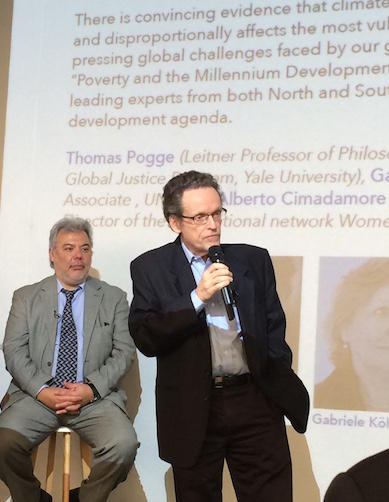Law and Climate
"Can law be used to save the climate?" asked researchers from the Bjerknes Centre and UiB at the Climate Summit in Paris.

Main content
- States have a legal duty to avoid climate disaster, said Thomas Pogge, Professor at Yale University, when he and his international colleagues presented the Oslo Principles on Global Climate Obligations at the Climate Summit in Paris in December.
While the negotiators at the Climate Summit in Paris were working up until the last minute to finalise a climate agreement, there are some countries who do not want a legally binding agreement - and they probably have good reason for this, as the law has made its mark on climate issues over the last year.
The role of law in relation to climate is a new perspective that has become increasingly visible over the last year. There have been several cases where states have been blamed for not doing enough to protect their citizens against dangerous climate changes. In June, the Netherlands was sued for recklessness by the Urgenda Foundation. The court supported Urgenda’s view that the government of The Netherlands has not done enough to prevent emissions. The Dutch State has appealed against the ruling.
The Oslo Principles
A few years ago, the lawyer Jaap Spier and the philosopher and social scientist Thomas Pogge sat down over lunch to discuss how one could use existing international law, human rights and other supreme laws, in order to identify ways in which international legislation places specific demands on states to reduce the emissions of greenhouse gases.
- The starting point for this discussion was a general feeling of unease about how politicians are conducting policies that are leading us over the edge of a cliff. We need to find out what we can do from a legal perspective, said Thomas Pogge, who is also Director of the Global Justice Programme at Yale.
- The debate has centred on human rights, where there is general agreement that climate change is precisely about human rights, says Jaap Spier, Special Legal Advisor to the Dutch Supreme Court and Honorary Professor at the University of Maastricht.
The result was the Oslo Principles on Global Climate Obligations, which sum up the legal obligations of states to prevent climate change.
As the legal experts write: “Climate change is a serious threat to humans, the ecosystem and life on earth and threatens global security and economy. Globally there is an increasing understanding that business-as-usual is not an option”.
- The stupidity of our time
Tore Furevik, Director of the Bjerknes Centre and Professor of Oceanography at UiB, likes the fact that international experts highlight human rights and international law in the climate debate: “There are many moral, ethical and also legal issues related to the climate changes we are currently witnessing. What right does the rich part of the world have to create natural disasters that will principally affect the poor part of the world, those who have done little to contribute to the problems and are least able to adapt to the climate changes? And what right do the people of today have to start processes such as desertification and rising sea levels that will create great difficulties for tens of generations to come. History’s judgement of the stupidity of our time may be merciless, says Furevik.
